The Lowari Pass and the City of Peshawar
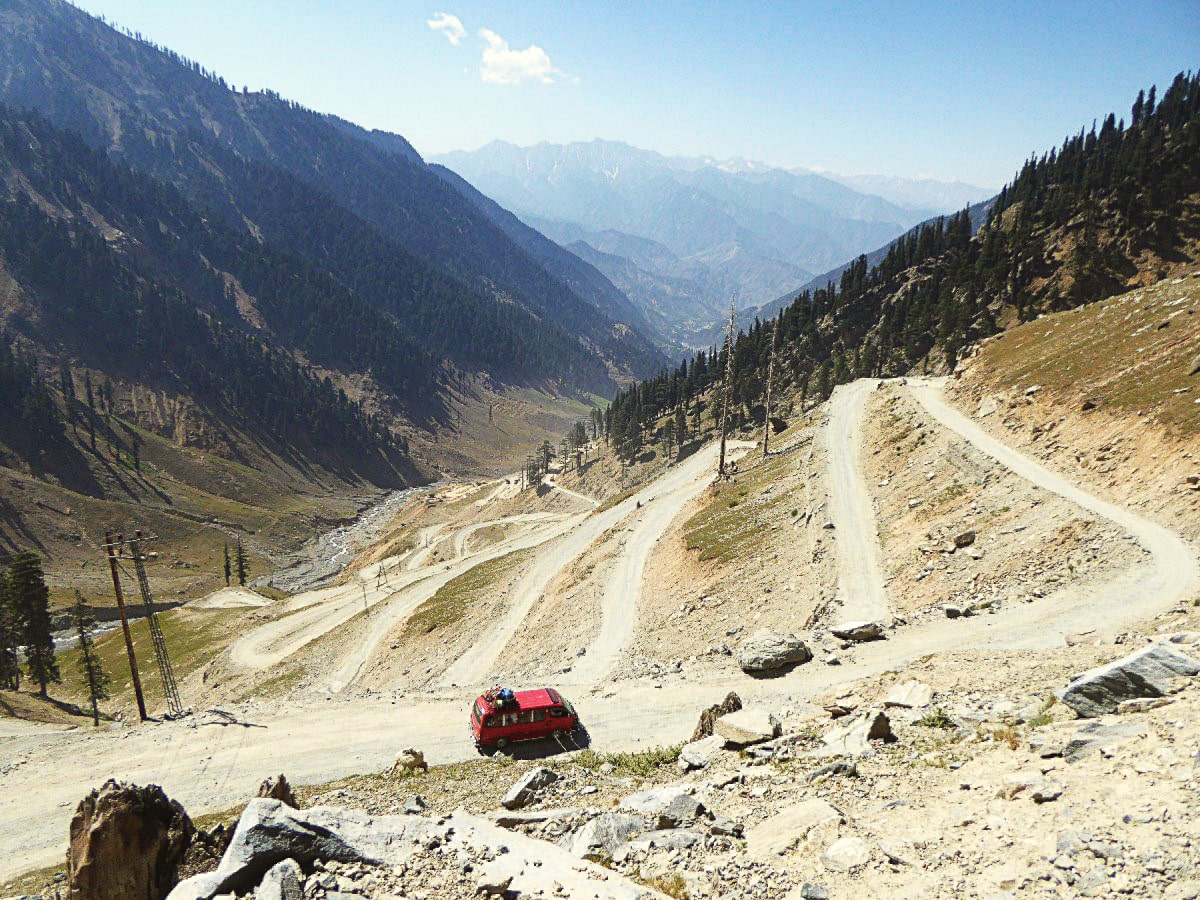
Lowari Pass.
If you are tired of sitting on a beach and think to yourself that you’ve done this a million times before why not try something different. Welcome to Pakistan, with a population of 221 million people you meet the good and the bad. Pakistan is a place packed with adventure, from the deserts of the South to the snow-capped Himalayan mountains in the Northern territories. In the North you hitchhike and pick cherries from the trees in what is describe as one of the contenders for where James Hilton’s 1933 novel Lost Horizon, a book that conjures up images of a Shangri-la, a Heavan on earth. Follow in the steps of British explorer Alexander Burnes along the 3000km Indus River which cuts the country in half, or to the South, a hot dry desert awaits and the forty bastions of Derawar fort. For now, the mountainous roads of the west await, to The Lowari Pass and the City of Peshawar.
If the Devil built a road, this would be that road. The Lowari Pass runs from Chitral in the Northwest of Pakistan and heads south over endless switchbacks to Peshawar, what was to be a 9-hour journey turned into a two day journey, and it was not for the weak hearted.
For this journey I had three friends with me, we had met several weeks prior at a hostel in Tashkurgan, the last town in China before we crossed into Pakistan, we decided we would travel together.
After leaving Chitral you will get to the town of Drosh here you will meet your new Police friends, they are armed, and they will keep you safe. It comes from the government that if Pakistani security sees a tourist, they must do their best to keep them safe, they will bring you from checkpoint to checkpoint, this arrangement happens on the spot and no money is ever asked for. Pakistan gets enough bad press; they do not want a dead tourist splashed across the world’s front pages.
The next checkpoint is manned by the Pakistani army, things are a little more serious here. They told me that the road was closed for a three day holiday, this was not true, there were cars and trucks passing us, I believe they were concerned for my safety. With each hairpin switchback the road surface gradually deteriorates and turns in to a dusty dirt track, with each switchback the margin of error gets tighter.
An oncoming jeep speeds around the corner just missing us, the policeman in our minibus gets out to report him. You do not make mistakes up here; they can be fatal. The Pakistani trucks are very ornate, some of the most beautiful trucks you’ll see, the decorations they put on the outside of their cabins are for goodluck but the weight of these decorations on top of their already overloaded trucks can make them top heavy and dangerous on these narrow roads as they slowly trundle up the pass squeezing past other vehicles as wheels cusp the edge of the mountain road.
About halfway up the pass the South Koreans built a tunnel to avoid the worst of the pass, in winter the Lowari Pass closes due to heavy snowfall and Ice, this is a problem for the truckers who ply this route. The truckers have two options for overcoming this issue, one is to cross into Afghanistan, this is a long hard journey and is not safe. The second is not much better, the truckers will hire locals to empty and carry the contents of their trucks up and over the pass to a waiting truck on the other side. Luckily the day I was at the tunnel it was closed as the construction work was still ongoing.
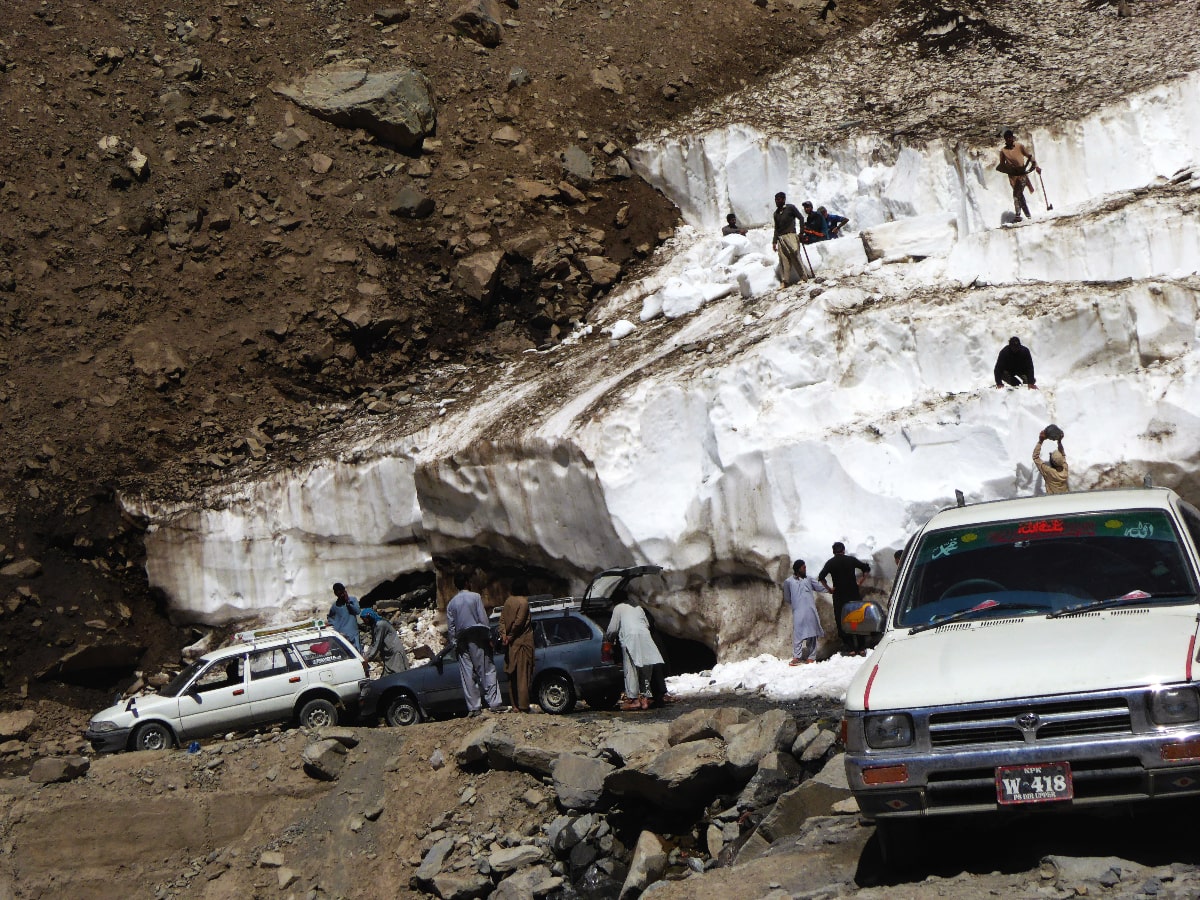
Men collecting ice at Lowari Pass.
At 3200 meters you are at the top of The Lowari Pass, the views of the snow-capped Hindu Raj mountains are magnificent. I met an American here, he has come from the Swat Valley, the Swat is synonymous with Malala Yousafzai, the Nobel Peace Prize winner who was shot in 2012 when Taliban boarded her school bus.
Just over the pass the locals carve Ice blocks from a glacier, it's quite a sight, they pack their cars and race down to the town before the ice melts away. Before the world had freezers this is one way how people would get ice, I have seen nothing like this anywhere on my travels.
I had never heard of Dir before I arrived in this town. Aljazeera in 2009 had reported that during a military operation in Lower Dir the Pakistani army “killed at least 46 suspected Taliban fighters in air and ground operations.” In 2012 14 member of a peace jirga (council of leaders that make decisions, typically ethnic Pashtuns in Afghan/Pakistan) were killed in the Jandol area of Lower Dir when an IED planted in the road by the Taliban had exploded. Although this was 5 years later when I was here the region is safer than what it was with thanks to the military operations that the Pakistan army has carried out, but you still need to be careful, there are still some militants around.
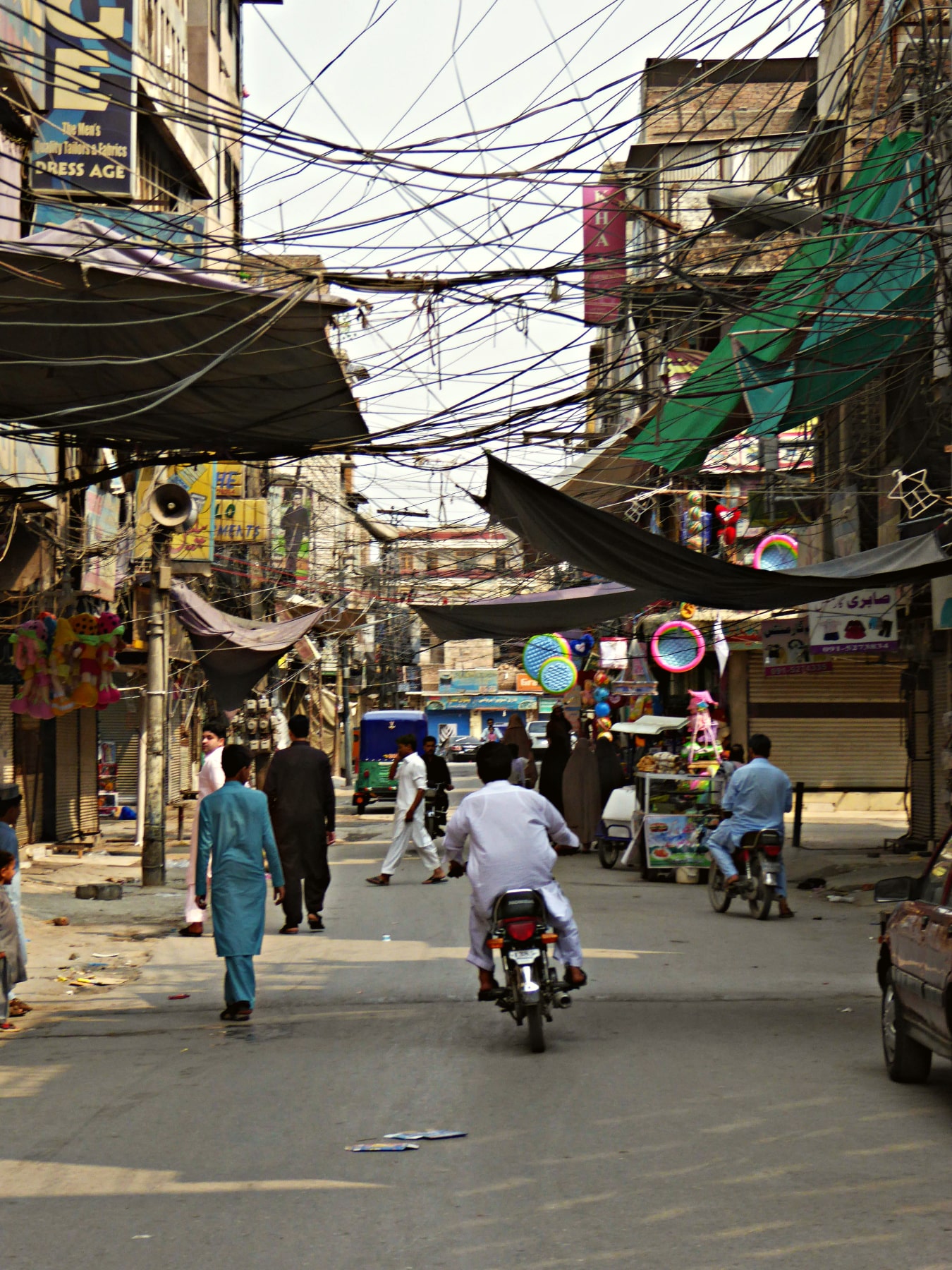
Pashawar City street.
When we arrived in Dir the driver tried to convince me that I was in Peshawar; he was going to charge me the same about we agreed upon to get to Peshawar, with smartphones this trick does not work. Dir is a place where you do not wander after dark, we did not know this, we went looking for food down in the Bazaar. Myself and my fellow travellers were walking in a line one on front of the other, a large crowd of locals gather around us, I don’t believe they are used to tourists in this region, a man pulls up on a motorbike, he says he is Police, but I have just checked in at the police station, he shows me nothing that he is a policeman. We walk on, we are hungry and tired. I turn around and my friend is gone. A few minutes later a police pickup truck swings around and out hop armed policemen we are taken back to our hotel and questioned by the Chief of police about our missing friend, they were all out looking for him. Eventually they found him, he had followed a local into a restaurant without telling us.
That night a policeman sits outside of my bedroom door. At 7am we wake with a loud knock, they walk us down single file under armed guard to the bus station and put us on a bus. With 241kms on our schedule today the bus does not slow down just because of some trivial bends and 100-meter drops off the side of the road.
Later, we picked up another armed escort, this escort is the Anti-Terrorist Squad, things are different here, it feels different, we are on the border of what was at the time the Federally Administered Tribal Area or FATA (It’s since been incorporated into the Khyber Pakhtunkhwa province and has government representation in Islamabad, previously it was run by tribal leaders) this area runs along the Afghan border, here the Taliban and ISIS like to make themselves known, all too often with terrorist attacks in cities like the one I’m heading too next.
As the sunsets, we finally get to The City of Flowers: Peshawar, a large chaotic city of about two million people. Peshawar can at times be a troubled city. Just eight years ago before my arrival in 2017 newspapers were calling Peshawar a city on the frontline. Nangarhar which is only a short hop from Peshawar across the Afghanistan border had been declared part of Daesh’s Caliphate. According to army.mil in “January 2016, U.S. forces in Afghanistan aggressively pursued ISIS-K in remote and non-populated areas of Nangarhar that they claimed as their caliphate,” this would’ve pushed some of ISIS-K members into other regions.
In 2017 the Taliban and ISIS were known to be in and around the city of Peshawar. My hotel, The Emaraat had armed security in the reception area at the front entrance, If I wanted to go anywhere in the city an armed policeman would have to be with me.
In any unstable place like this, the safest part of a hotel is high up in the building and away from the rooms facing out the front of the hotel. If there was to be an explosion outside the front entrance the odds are that you would be away from the blast, and you would have more time to make your escape.
The first night we stayed here was difficult. The four of us were all in the same room in the hotel and at around midnight my new friend from Japan started shaking violently, he said he felt cold, but he had a temperature and was covered in blankets, he was only getting worse. At night, the city comes alive, this was during Ramadan, everyone had broken there fast, and the city streets were packed with people and tuktuks, (2 seater taxi) and we needed to be at the hospital now. The policeman came up to the room and then we all went down to the reception. The six of us including the driver and policeman were bundled in to the tuktuk, my friend squashed between us was getting worse, the traffic was slow, weaving through the crowds of people, but eventually we made it to The Lady Reading, a public Hospital. The first stop was check in where I had to explain his symptoms, then he was given an IV, the nurse tried to give him a used one, luckily my friend who was in and out of consciousness was with it enough to see this as the rest of us did not.
Although Dr. Ghangro was initially the sole focus of the blame the government now believe that he was not the only cause of the infections. These bad practices of reusing needles are rampant across Pakistan. “The only good thing about the outbreak has been that it laid bare the multiple flaws in the system that the government with support of U.N. agencies needs to address,” said Dr. Fatima Mir, a paediatric infectious disease expert working at the Aga Khan University in Karachi.
My friend had very bad food poisoning which he more than likely got from chicken he ate in Dir when he went missing. We got out of the hospital in 2 hours, it was certainly not the nicest places to be, but the staff were very friendly. We were told to keep the IV in his arm for 24 hours in case he had to go back, the next morning I removed it.
As I sat in my hotel room on the 23rd of June 2017, there was a string of attacks across the country, one bombing in Quetta, two in Parachinar and a targeted shooting in Karachi killing four police. In total about 100 people died as a result of terrorist attacks throughout the day in Pakistan.
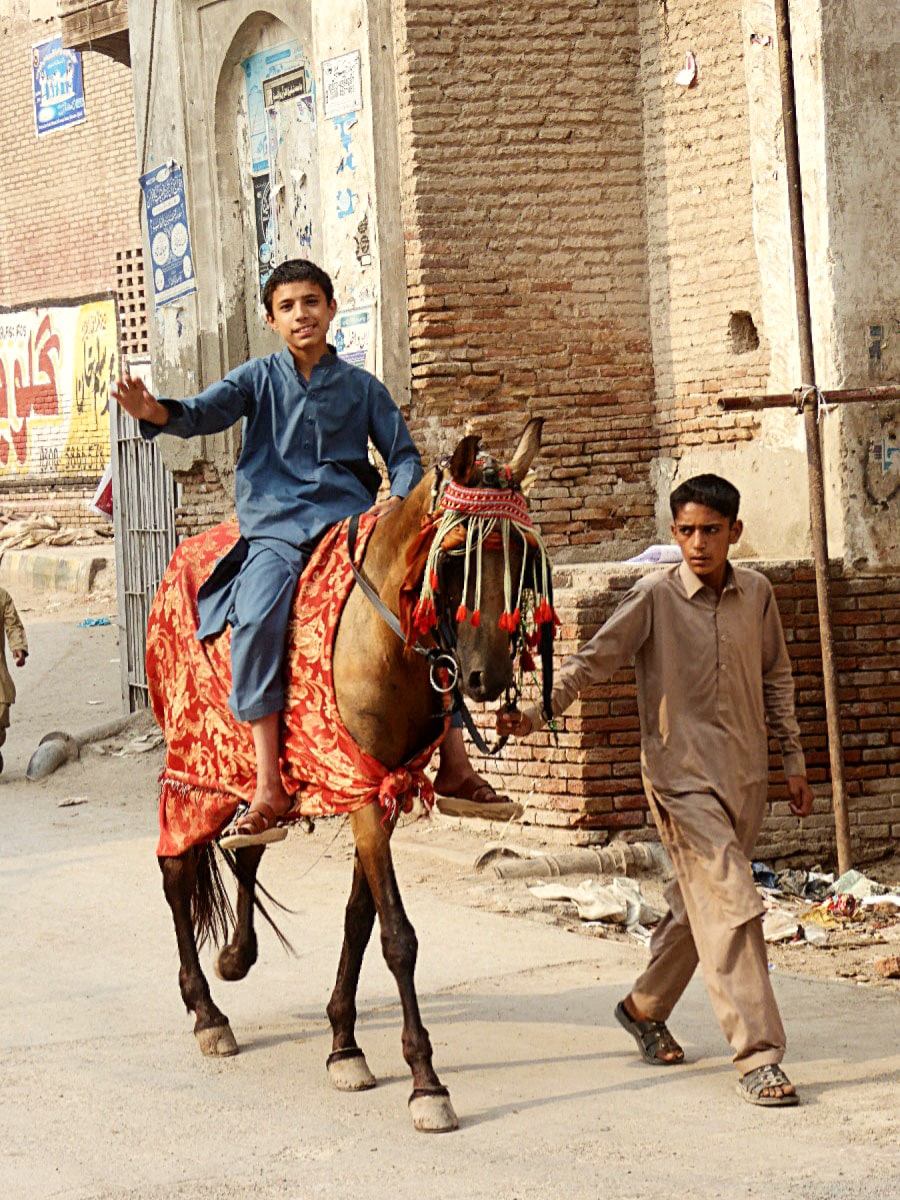
Children in Peshawar City.
The most horrific attack was in Parachinar 130km west from Peshawar. Two blasts one after the other tore through Turi Market during rush hour when most people would have been buying goods to celebrate the end of Ramadan. After the first IED went off, people and rescuers rushed in to help the wounded, that’s when the second blast hit. District Headquarters Hospital Parachinar Medical Superintendent Dr. Sabir Hussain said, “they had received 261 victims of the twin blasts, with 62 listed in critical condition.” the army had flown 11 critically injured people to the hospital in Peshawar.
Eid is when Muslims celebrate the end of Ramadan, a time when Muslims fast from sunrise to sunset, a few steps from my hotel 3 males and 1 female were asked to share an Eid meal with the locals as they broke their Ramadan fast. We sat down and waited for the sun to set, and we shared a meal while sitting in the middle of what was just moments ago a bustling street, when a city of 2 million people stops to eat, there's only silence and good company.
Peshawar is one of my favourite cities, it’s not like anywhere else in the world, it's dirty, with old colonial buildings falling apart, rubbish on the roads, the smell of burning in the air, horses and goats around the city's streets. But we need to look beyond this, the little details of the ornate hand- crafted buildings in the old city, the geometric designs in the century's old mosques, and the warm smiles of friendly people. Peshawar is known as the city of Flowers, it's an old city, a cultured city. The streets were once filled with story tellers and musicians, sadly many of these had to flee, many of those who didn't were executed by the Taliban up until 2014, in 2014 the Pakistani military carried out operation Zarb-e-Azb and this is when security began to improve in the region.
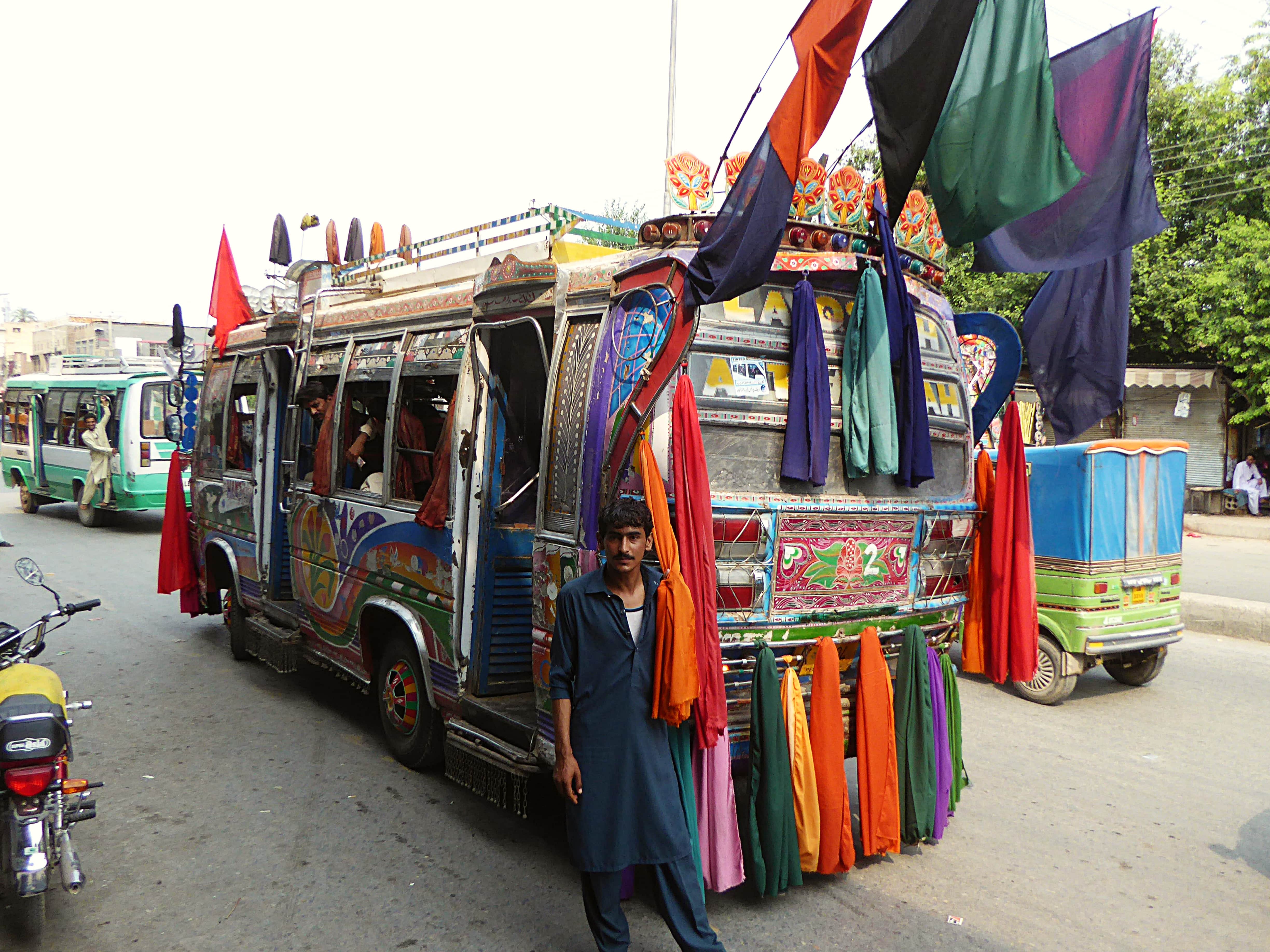
Peshwar bus with coloured flags.
We take a walk with our security around the city streets, and we happened upon a small amusement park. A mass of colour, noise and the laughter of young kids, a handspun Ferris wheel of red and blue, some swings manned by old men with long beards making a few quid and bringing delight to the young children. Buses with a multitude of coloured flags trailing from the back pass us on the road under the convoluted mess of powerlines.
I buy a sugarcane drink from a colourful Sugarcane stand decorated with painted birds. As I sip my cold drink the Policeman says we must immediately go back to the hotel, we get in a Tuktuk and make our way back. The problem here is we know that there are Taliban and ISIS in the city, they can see me, but you cannot see them, they don’t wear a uniform and I stand out. We were safe at the hotel, it’s too easy to become relaxed when your surrounded by good people.
The modern amusement park Fun Land is a taxi journey away, we pass a checkpoint into the affluent area of Peshawar, manned by several police, an RPG rests on the sandbags, a site that becomes normal, at the time no second thoughts are given, this is a normal object in this land, but in your head, you hang on to these images, when you get home back to a normality you question them, an RPG has only one use, that is to take another person's life. The mass of guns, the deaths, the indiscriminate attacks, the what ifs, innocent lives, young an old brought to a sudden halt. You will sit at home, and you will read of these atrocities that happen after you leave these places, people you spoke to, the face you seen, where are they now.
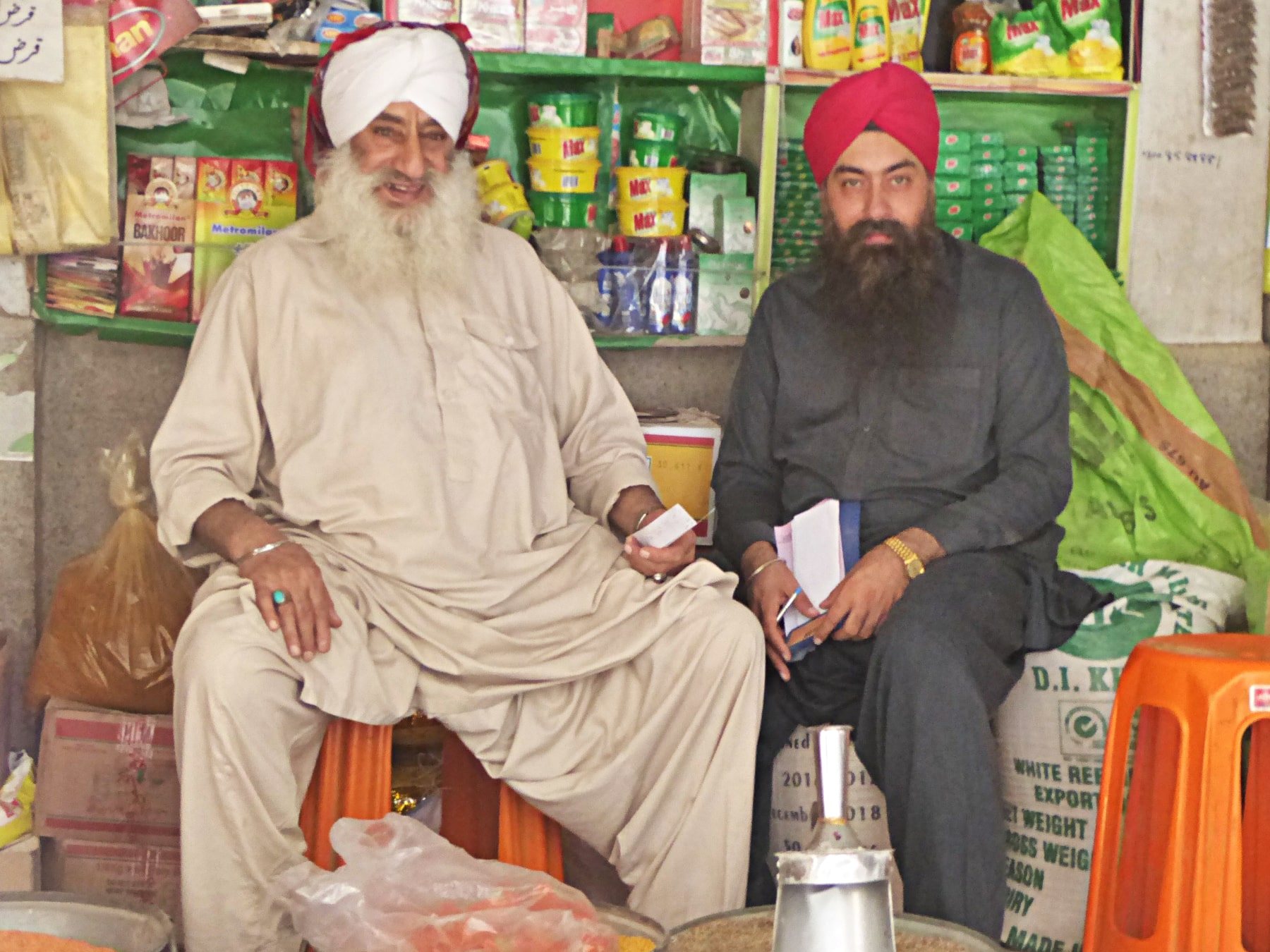
Shopkeepers in the Peshawar City.
On the 4th of March 2022 in Kucha Risaldar Mosque, Peshawar an ISIS Suicide bomber entered during Friday prayer, he blew himself up using 5kg of explosives with ball bearings added to cause maximum damage, these ripped through the bodies of 252 people leaving 62 of them dead and 190 injured.
“A witness who identified himself as Naeem lives next door to the mosque” reports Aljazeera.
“First I heard five to six gunshots and then I saw the suicide bomber enter the mosque and a huge explosion occurred,” he told Al Jazeera. “The doors of my house opened with a bang and I fell down on the ground. When I entered the mosque, there was smoke and dust and people were lying in blood.”
The crowd of kids follow us as we walk around the streets, they all want “just one selfie” a phrase I never heard so much in my life repeated by groups of 30 odd kids. The crowds are too big, you can’t be sure who is who, a McDonalds is nearby, we go in for some respite, we escape the crowds and the heat, doors are held open, the staff shake our hands.
Back in Funland we queue for the Bumper cars, the staff try to usher us to the front, but we don't want any special treatment, we wait our turn, and, in a while, we find our bumper cars. The parks security watches, he carries a long baton and hits the fence as the kids gather around watching us.
I will always have fond memories of Pakistan, this is not a destination to go to on a whim It’s heaven on earth one minute, in the next it can be a troubled place, travel is hard, but the people are kind and will go out of their way to help a stranger. Here you can rely on the locals, the majority of Pakistanis will have your best interests at heart.